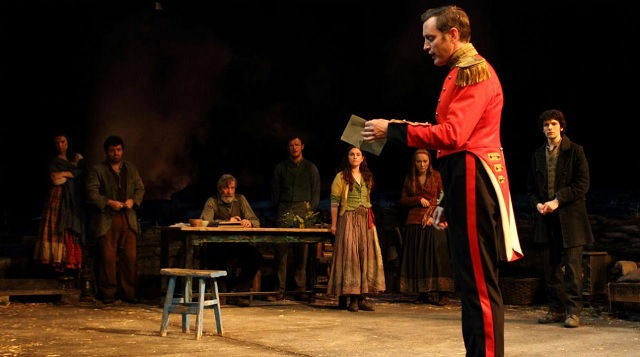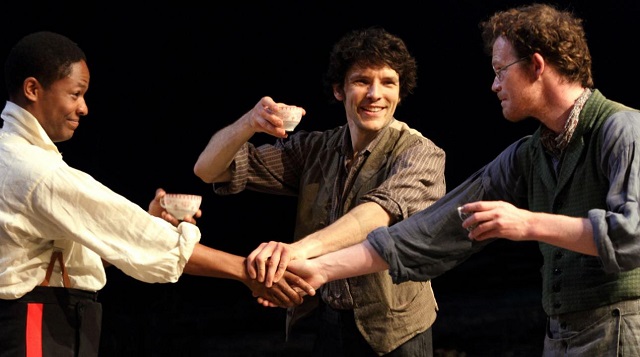Review | Translations (National Theatre) Theatre
Arts & Culture, New in Ceasefire, Theatre - Posted on Sunday, August 26, 2018 12:59 - 0 Comments

(Photo by: Catherine Ashmore)
Translations (National Theatre)
by Brian Friel
22 May to 11 August 2018
[Note: This review discusses major plot elements]
I was recently fortunate enough to be able to see a new production of Brian Friel’s Translations at the National Theatre. Interested as I was in language, colonialism and the relationship between the two, I was intrigued by the play from the outset. It didn’t disappoint.
Set in the 1830s, when England’s colonisation of Ireland was well under way, the story of Translations takes place in one of the many Irish towns and villages that were renamed by the English and placed on their new colonial map. The play explores the relationship between the villagers — a diverse group, all attending adult evening classes at the village school — and the two English officers taking measurements of the village for the map.
Caught between these two worlds — and saddled with the task of breaking down the barrier of language through interpretation — is Owen, known to the English as ‘Roland’, the schoolmaster’s son and a worker recruited by the officers to help with the map. The process of creating the map, and renaming various towns and villages in the area, is clearly emblematic of the colonial desire to reshape and restructure colonised land and, in turn, the lives of colonised people.
Indeed, it becomes clear early on in the play that language is a central theme, and that it is used as a metaphor for the underlying tensions of the relationship between coloniser and colonised. The viewer quickly becomes aware that, although the play is almost entirely in English, Friel’s villagers are in fact ‘supposed’ to be speaking Gaelic. Whilst this may feel difficult to get one’s head around at first, especially given the accents of the villagers — which are unmistakably those of Irish people speaking English — it gradually becomes easier to accept; not least because the difference in accent and manner of speech between the villagers and the Englishmen is so accentuated.
The primary use throughout the play of a single language is indicative of Friel’s mastery, and that of the actors in the production, in convincing the audience of this difference through more subtle means. The play’s main forays into languages other than English are not, as one might expect, snippets of Gaelic from the villagers, but rather, the occasional phrase in Latin – mainly from the old school master. Whilst this character is evidently more educated than most of the villagers, it is clear that he does not care to speak English to the officers, and that this is more a question of principle than of ability. The officers’ first appearance in the play is marked by a clear diffidence from the villagers, and a suspicion of the officers’ plans.
The confusion around Owen’s name is another facet of the play, one that brings to light the subtle conflicts of the colonial relationship. When the character is first introduced — he has just returned to the village after several years away — he is greeted as ‘Owen’. It soon becomes evident, however, that the Englishmen have christened him ‘Roland’, and — in the classic colonial manner — are completely oblivious to the fact this is not actually his name.
The tension surrounding this comes to a head when Owen and the English Lieutenant George — ostensibly good friends — are working on the map. Owen abruptly and angrily declares that his name is not ‘Roland’, and the resentment expressed in his statement is given a moment of exposure to the audience before being masked by the humour of the lieutenant’s disbelief — and the ensuing hysterical laughter between the two men onstage. In this encounter, Friel captures a fundamental essence of colonial social interaction: the oppression of the colonised becoming explicit only for a second before being glossed over by good-natured banter.

(Photo by: Catherine Ashmore)
The casting of Adetomiwa Edun as the lieutenant makes his role, and especially this scene, all the more interesting. George is the more likeable and sympathetic of the two officers, and the ultimate liberal coloniser, with a love of the exotic. He talks at length of his wonder at many aspects of rural Irish culture in greatly romanticised terms, while Owen rushes around the stage working hurriedly on their supposedly joint task of placing the village on the map.
In an era when actors of colour are constantly fighting for roles in theatre — when the struggle for representation is far from over — a black actor portraying such an inescapably white character seems like a victory for diversity. But Edun’s effortless acting also adds another complex dimension to the role. The interactions between George and the villagers — including his (linguistically strained) flirtation with Maire, one of the village women — illuminate the strong presence of race in the play; a presence that may not otherwise be apparent to a contemporary audience, given that people of Irish origin are generally considered to be white. The audience is thus prompted to cast its mind back to a colonial view of racial hierarchy in which Irish people were, in fact, constructed as racially inferior to the English.
The discussion of Owen’s name is, in this context, not only charged with the difference of nationality, but also with the crucial difference of race — itself a colonial concept — which has informed English colonialism across the globe. Indeed, the simmering hostility of this interaction is not fully brought into the open until towards the end of the play when, shortly after the lieutenant goes missing, his senior officer, the captain, approaches the villagers and threatens nastily to throw them off their own land. At this point, although the captain’s words are still being conveyed to the villagers through the filter of Owen’s interpretation, the interaction between the actors is such that the audience senses that the barriers of language have been broken down, and that the villagers understand all too well the menacing nature of this threat.
The production is highly evocative of the story’s setting; with a rich, green landscape backdrop framing a small space in which the action takes place. The fires used by the officers to light their way — which starkly illuminate their red military uniforms — accentuate the sense of threatening intrusion into this small, cosy environment. As a result, the audience is consistently reminded of the importance of the village setting and of the central questions of place, belonging and dislocation that foreground the play — questions, of course, which remain highly relevant to contemporary British society, and make this production a remarkable feat of modern theatre.



Leave a Reply